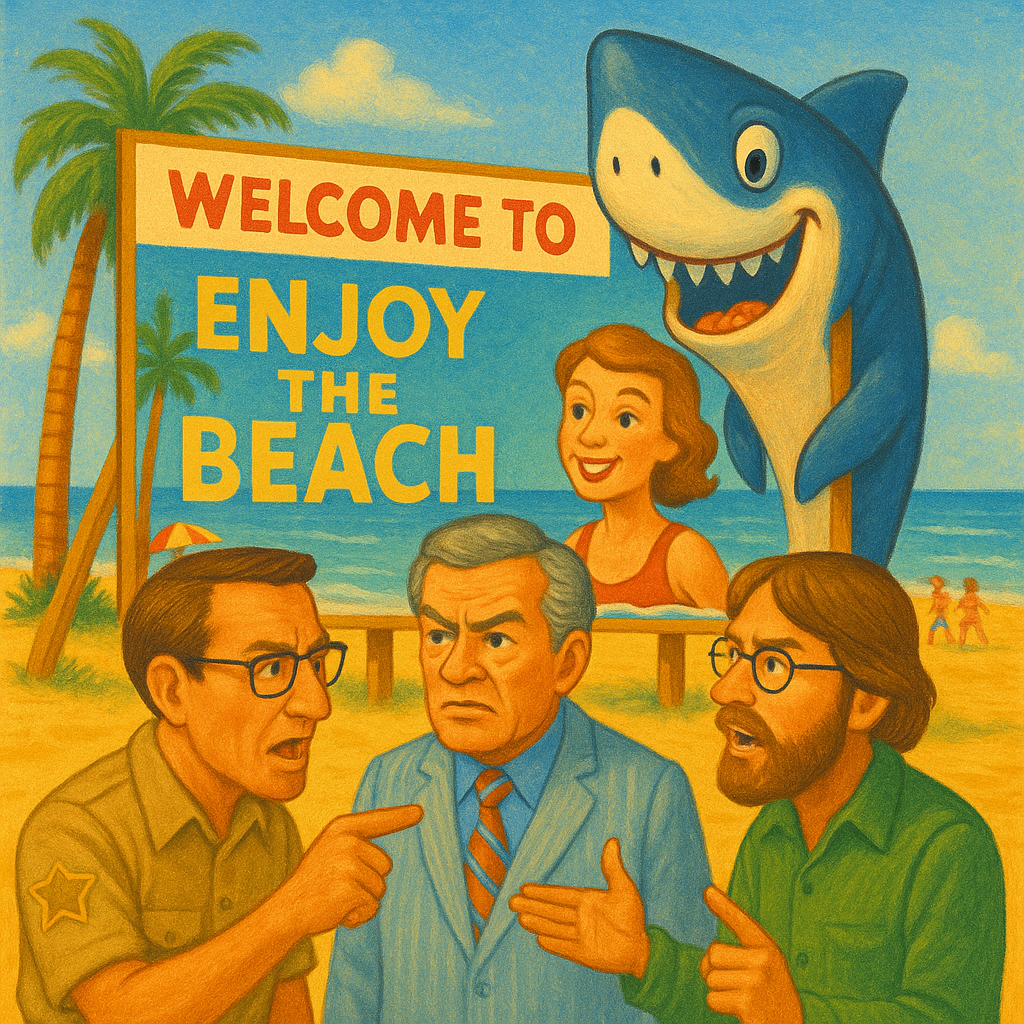You're Gonna Need a Bigger Boat: What Jaws Can Teach Us About Product Management

In honor of the 50th anniversary of Spielberg's classic, we're taking a product-centric dive beneath the surface.
In the summer of 1975, Jaws hit theaters, and nothing was ever the same again. The film didn't just give us a fear of the ocean; it invented the summer blockbuster, set a new bar for suspense, and introduced us to a perfectly paced story of denial, danger, and leadership under pressure.
And 50 years later, it still holds up… especially if you look at it through the lens of product management.
At its core, Jaws is a story about ignoring the data, underestimating risk, juggling stakeholder pressure, and ultimately taking ownership of the problem before it swallows you whole. Sounds a lot like a day in product, doesn't it?
Ignoring the Signals: "The Beaches Must Stay Open!"
In Jaws, the mayor insists the beaches remain open despite evidence of a deadly shark nearby. Why? Tourist dollars. Public image. Fear of lost revenue.
The mayor represents that classic stakeholder who prioritizes short-term business metrics over user safety- demanding launches despite red flags, dismissing negative feedback to protect quarterly numbers, pushing forward when the data screams "stop."
In product, stakeholders often push for launches, ignore bugs, or downplay negative user feedback to hit business goals. But ignoring early signals can lead to disaster. Just because the first "attack" (a bad review or a security flaw) seems isolated doesn't mean it isn't part of a bigger problem.
Product Lesson: Data doesn't care about your deadlines. Don't let wishful thinking drown your users.
Hooper = The User Researcher (That No One Listens To)
Matt Hooper, the oceanographer, brings the science. He's the voice of reason, showing the evidence, warning of the danger. But he's dismissed—until it's too late.
This is your UX researcher or data analyst flagging friction in onboarding, warning about low NPS scores, or begging you to fix a pain point that users keep surfacing in interviews.
Product Lesson: Good PMs make space for inconvenient truths. Listen to all stakeholders, including the ones with inconvenient truths.
Brody = The Product Manager in the Middle
Chief Brody is new to the island. He's not a local. He wants to protect the people, but he's pulled in every direction… by the mayor, the town, the scientist, the fisherman.
He doesn't write code. He doesn't swim with sharks. But he's responsible for the outcome.
Product Lesson: PMs are often accountable without being fully in control. You'll never satisfy everyone but if you lead with integrity and insight, you can still save the day.
Quint = The Legacy Process That Says, "We've Always Done It This Way"
Quint isn't just a shark hunter; he's the embodiment of the entrenched process. He's old-school. He knows his craft inside and out. He's battle-tested, and no one doubts his experience.
But he's also the guy who smashes the radio. Rejects new tools. Dismisses collaboration. And drives the boat until the engine blows.
And here's the kicker: Quint doesn't survive the mission. His expertise is real, but his refusal to adapt, to work with Hooper's modern tools, to listen to different approaches; ultimately costs him everything.
In product terms, Quint is that legacy workflow, system, or mindset that once worked beautifully but now refuses to evolve. It's the Excel tracker that can't scale, the unspoken tribal knowledge that isn't documented, the manual process clung to with pride. And just like Quint, these systems can drag the whole mission down with them.
Product Lesson: Experience matters but rigidity kills. The strongest contributor can still sink the ship if they won't evolve with the mission.
🦈 The Shark = Your Hidden Technical Debt
At first, no one sees the shark. Then it's just a fin. Then it's a headline. By the time the danger is undeniable, the damage is done.
Every product has its lurking technical debt those shortcuts taken under pressure, the quick fixes that were never meant to be permanent, the architectural decisions that made sense two years ago but now threaten to bring everything down.
Like the shark, technical debt is invisible until it strikes. It compounds silently beneath the surface, growing stronger while your team focuses on features and deadlines.
Product Lesson: What you can't see will eat you. Monitor what matters, even if it isn't sexy.
Defeating the Shark Requires Cross-Functional Alignment
In the end, the only way they survive is by combining Brody's leadership, Hooper's knowledge, and Quint's experience; three very different approaches working together under pressure… and a little bit of luck.
Product success is never a solo mission. It takes coordinated action, mutual respect, and the humility to admit you might need help, or a bigger boat.
🎬 Final Reel
Jaws wasn't written for product people, but it tells our story better than most real-world case studies. It's about the tension between risk and reward, truth and spin, short-term pressure and long-term responsibility.
Sometimes, you listen to the data. Sometimes, you fight the tide. Sometimes, you lose a Quint.
And sometimes, when the product risk is coming straight at you and all you've got is a tank, a rifle, and your instincts….
You smile, aim, and say: "Smile, you son of a....."